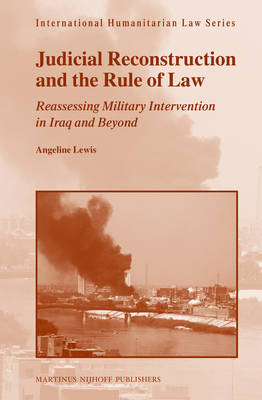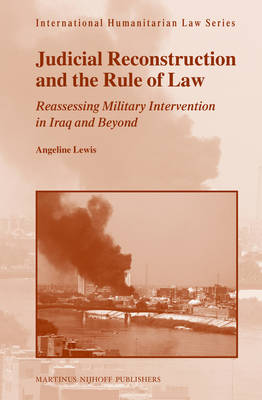
- Afhalen na 1 uur in een winkel met voorraad
- Gratis thuislevering in België vanaf € 30
- Ruim aanbod met 7 miljoen producten
- Afhalen na 1 uur in een winkel met voorraad
- Gratis thuislevering in België vanaf € 30
- Ruim aanbod met 7 miljoen producten
Zoeken
Judicial Reconstruction and the Rule of Law
Reassessing Military Intervention in Iraq and Beyond
Angeline Lewis
€ 140,63
+ 281 punten
Omschrijving
The idea of building a blueprint 'rule of law' through military intervention has seized the imagination of practitioners and theorists alike in the past decade of peacebuilding operations, and an emphasis on simultaneous judicial reconstruction and security sector reform has emerged as their central strategy. This work, in a fresh approach based on recent military operations in Iraq and beyond, challenges both the universality of the blueprint and the doctrinal assumption that institutional reform by military interveners builds peace and legitimacy. In a comprehensive review, the essential role of the community in developing its own relationship with law, while interveners refocus exclusively on restoring public security using their extraordinary powers under international humanitarian law, emerges as the only future for 'rule of law operations.'
Specificaties
Betrokkenen
- Auteur(s):
- Uitgeverij:
Inhoud
- Aantal bladzijden:
- 266
- Taal:
- Engels
- Reeks:
- Reeksnummer:
- nr. 39
Eigenschappen
- Productcode (EAN):
- 9789004228108
- Verschijningsdatum:
- 27/08/2012
- Uitvoering:
- Hardcover
- Formaat:
- Genaaid
- Afmetingen:
- 155 mm x 235 mm
- Gewicht:
- 1219 g

Alleen bij Standaard Boekhandel
+ 281 punten op je klantenkaart van Standaard Boekhandel
Beoordelingen
We publiceren alleen reviews die voldoen aan de voorwaarden voor reviews. Bekijk onze voorwaarden voor reviews.











